By Joseph R. Svinth Copyright © 2000 All Rights Reserved
Editor's notes: A version of this article appeared in Wrestling Then & Now 1998 annual, and it is reprinted here as a continuation of the story begun in "The Discipline Necessary for Attaining the Highest Rewards: Amateur Wrestling at the University of Washington, 1905-1942," http://ejmas.com/jcs/jcsframe.htm, volume II. For the additions, the assistance of Mark Hewitt, Graham Noble, and Steve Yohe is gratefully acknowledged.
The theme of this piece is that the professional wrestling of great-grandpa’s day was as much a circus act as the professional wrestling of today, and that the athletes and promoters simply used different methods to work (e.g., arouse) the crowd. Because this is a contentious argument -- if you believe some wrestling writers, turn-of-the-century wrestling was honest competition rather than muscular theater, and Frank Gotch was the finest (if dirtiest) wrestler who ever lived -- I thought it better to let the sportswriters of the day speak for themselves rather than summarizing their words.
Editorial annotations follow entries in italics.
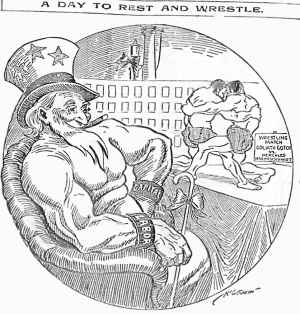
From the Chicago Daily Tribune, September 4, 1911
"Dr. B.F. Roller," Seattle Mail and Herald, December 22, 1906, 12.
He represented the Chicago Athletic Association against that of New York, and broke the world’s record in discus throwing, and made 148 feet 6 inches with a 16-pound hammer.
Dr. Roller graduated from the medical department of the University of Pennsylvania with the highest honors, winning a Saunder’s prize of $100 in gold.
He used athletics as a means of getting his education by teaching wrestling and playing football… Coming to Seattle in 1904 Dr. Roller accepted a professorship in the University of Washington, delivering lectures on physical culture and hygiene and also having the direction of all the athletic work of the University and the Seattle Athletic Club. He resigned his position in the University for the practice of his profession [wrestling], to which he is now devoting all his energies.
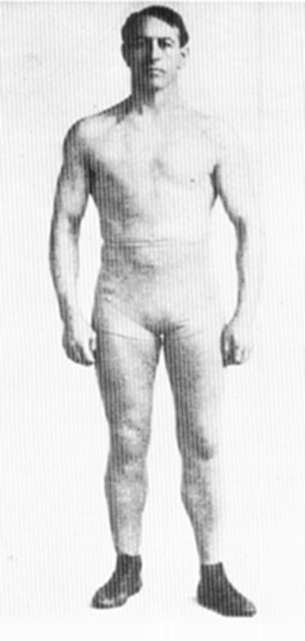
‘It’s a poor game this wrestling. My advice to aspirants is – "don’t try it." Because there’s no money in it until you are champion. It’s a long, hard fight up to that point, and there’s room for only one at the top. And after you’re pushed away, you’re done for good. At the best you can’t last longer than from five to seven years. It’s pretty hard at the end to settle down to humdrum life. The old game spirit is in you. You’ll think of the crowds, the glare of the calcium lights, the cries for the champion, the struggle on the mat. And you rebel. I rebel even now when I stay long on my farm.’
"Roller Wins in Private Contest in Two Straight Falls," Seattle Post-Intelligencer, September 26, 1907, 10.
"Dr. Roller Beats Emil Klank Easily," Tacoma Daily Ledger, September 28, 1907
The match was reputed to be for $1,000 a side and was pulled off over a saloon in West Seattle. About twenty-five invited guests were present… Eddie Gaffney, who used to wrestle for the Seattle Athletic Club, was the referee. Charley Beckingham, county commissioner, was timekeeper. Joe Shulte, a big Indian who learned to play football at Carlisle and who has been doing some fighting since, was in Klank’s corner and Lonnie Austin and Tom McDonald fanned Roller.
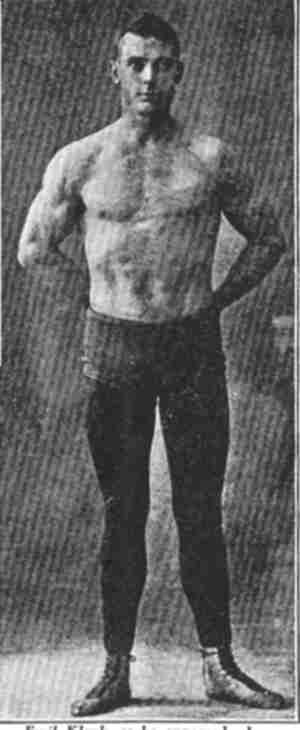
"Roller the Victor in Great Wrestling Match," Tacoma Daily Ledger, November 4, 1907.
"Roller Wins, As Expected," Tacoma Daily Ledger, January 24, 1908.
It was as poorly managed an affair of the kind as was ever seen even in the sawdust district of the early days… Burns is such an old stager at the wrestling game that he does not care for any more glory. He does not make any effort to conceal the fact that he is sticking with the sport solely for the money. The division of the proceeds last night was made entirely to Burns’ liking, win or lose. He had nothing to gain by winning and nothing to lose by losing…
Last night’s exhibition served merely as an advertisement for the [forthcoming] Gotch affair.
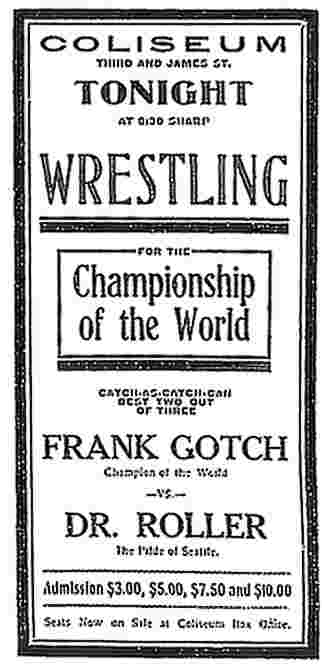
Poster for the Gotch vs. Roller match held in Seattle in July 1908; Gotch, who was advertised as the American champion, was of course the winner.
"Roller Too Clever for Big Turk," Seattle Times, June 10, 1909, 9.
Between the bouts all sorts of challenges were read and wrestlers were introduced. Matchmaker Jack Curley, with his bland smile, handled this part of the performance nicely.
The challenge that created the most interest among those in the know came from Bert Warner. For some reason or other Warner has it in for Roller, and has been making cracks for weeks that as soon as Roller came back to Seattle he was going after him…
Other challenges were bugled by John Berg, who used to be known around here as the Bellingham Strong Boy, but of late has been traveling under the name of Charles Hackenschmidt; Henry Ordemann, of Minneapolis, whom Gotch picks as his successor; Charles Olson, of Indianapolis, who was known around Seattle a few years ago as Miller, and who once wrestled an impromptu match with Joe Carroll on the stage of the Grand Opera House for a $50 note; and Americus, of Baltimore, one of the best wrestlers in this country.
This scenario, the feud so beloved
in modern professional wrestling, continued throughout the summer: different
wrestlers challenging Roller, who had never been defeated in Seattle. Finally
came the match everyone had been awaiting: Roller’s meeting with Gotch’s
handpicked successor.
"Ordeman and Roller Will Fight to a Finish Tonight," Seattle Post-Intelligencer, September 3, 1909, 10.
Joe Carroll and Doc Roller have had a falling out and now Carroll is after some man who can beat the big medico… It wasn’t so very long ago that Joe was claiming Roller could defeat any man in the world barring Hackenschmidt and Gotch, and now he thinks the woods are full of wrestlers who can make mince pie out of the doctor…
Personally, I believe Carroll when he
says he can find an American, other than Gotch, who can throw Roller. I
believe he can, beyond question.
The big physician narrowly escaped serious injury. He was knocked completely unconscious but not completely hurt…
The dope had gone out that Joe Carroll imported Ordeman from Minneapolis especially to beat Roller, and there was literally a fight for tickets.
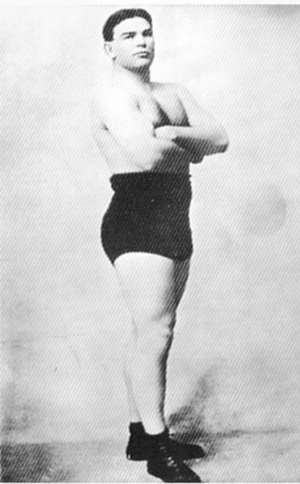
The only mat notable who failed to use the Union station iron gates to make his getaway was Dr. Roller, and he left on the noon boat for his summer home at Eagle Harbor. He told Jack Curley that he had no set plans, but that he would want a few days in the country to rest up and think over his future plans.
"The Wrestlers Have Gone," Bobby Boyce, Seattle Argus, September 11, 1909, 5.
"Bert Warner Quits before Dr. Roller," Seattle Post-Intelligencer, September 21, 1909, 10.
Then followed the spectacle of Warner deliberately falling on his back before Roller had put a hand on him and Referee [Tom] McDonald gave the fall to Roller.
Then Carroll was satisfied. ‘Now my man will go in and beat Roller just to show he can do it,’ he yelled to the spectators.
By this time the crowd was wild with excitement… But if the crowd expected any whirl of arms and legs, any spectacular headspins or grand and lofty tumbling, it was disappointed. The match was intensely exciting throughout because of the bitter hatred with which the men fought, but they worked slowly and carefully…
Instead of showing Roller up, Roller showed Warner up last night. He never gave Warner a chance… There is no question that Bert Warner, or Billy Maynard, or Bert Shores, or whatever his real name is, can wrestle. But he is not in Roller’s class except on the defense…
The end came as unexpectedly as the other events of the evening. Roller picked Warner up with a crotch and arm hold, poised him a moment in the air and then threw him on the mat, falling on top with all his weight.
It was exactly the same treatment that Roller got a few days ago from Henry Ordeman. And, as in the previous case, the man underneath did not get up.
"Roller Wrestles at Purdue," University of Washington Daily, October 28, 1909, 4.
Be that as it may, on September 23,
1909 US postal authorities indicted Joe Carroll, Bert Warner, and eighty-two
others on the charge of fixing horse races, foot races, and (say it ain’t
so!) wrestling matches. The eighty-five victims named in the case included
Hans Anderson of Ketchikan, Alaska; F. Ellison and H. Ford of Vancouver,
British Columbia; and John H. Sizer of Seattle.
"Penitentiary Doors Yawn for Joe Carroll," Seattle Times, March 10, 1910, 18.
There are about eighty members of the famous John C. Maybray gang under indictment back there, and it is believed that others will … plead guilty.
Carroll, … who was indicted under the name of George Marsh, is well known in Seattle. He came to the Northwest country more than ten years ago and gained an unenviable notoriety up in the Klondike region. He took Frank Gotch up there under the name of Kennedy, and a lot of trusting miners were plucked of their gold dust betting against Kennedy.
Later, Gotch and Carroll stopped at Bellingham quite a while. Carroll was Gotch’s manager and boosted him into the championship…
After the wrestling game had been put on the blink in Bellingham, Gotch went East and Carroll came to Seattle. He had no part in any public matches around here until he took Dr. Roller under his wing, but there were rumors of fake matches pulled off in a little house on the shores of Union Bay…
Carroll and Roller made good money in the wrestling game here, but when Roller went East he went alone and put himself under the management of Jack Curley in Chicago…
Carroll then began a systematic campaign
to discredit Roller and kill the wrestling game in Seattle, and Bert Warner,
or Bert Shores, or whatever his real name is, was the man used by Carroll
to badger Roller into a match…
They are all doing time as the result of sentences imposed by the federal court at Council Bluffs, and it is the first time any of them have worked in some time.
For his part, Maybray only said, "I never ‘milked’ an honest man." Carroll meanwhile returned to promoting wrestling, and as late as 1920, he was telling anyone who would listen that wrestling matches were fixed, and that the current champion, Jim Londos, refused to meet anyone on the level. (Which was true -- in March 1934, Pete Ladjimi said in a Los Angeles court that the only people allowed to wrestle Londos had previously agreed to let Londos win -- but back then the fans didn’t want to hear that.)
Anyway, the following entry describes one way that the marks were fleeced.
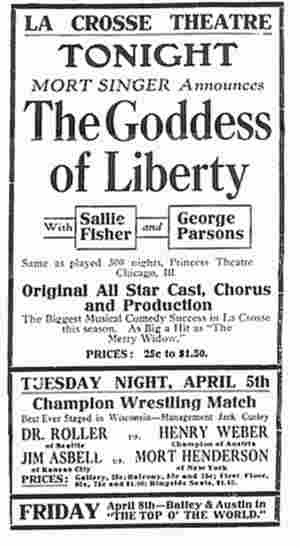
"Stranger Thought He Could Wrestle," Seattle Post-Intelligencer, July 15, 1906, Sports, 1.
A stranger drifted into the neighborhood, and when the subject of catch-as-catch-can came up for discussion he showed passing interest.
Yes, he had wrestled a little, and thought he might be able to give the ‘strong boy’ something to do. The match was made, and again, strange to say, Ole Marsh, who is in reality Joe Carroll, one of the best wrestlers in the country, bobbed up as referee.
Harrington was prosperous. Everybody had money and they bet it on the ‘strong boy.’ It looked like a cinch. When they had got down a fat sum they went back home for more.
The match was pulled off and the stranger showed the ‘strong boy’ things about wrestling he had never heard of or dreamed existed.
Harrington came to earth with a dull and sickening thud. The stranger proved to be Frank Coleman, the Chicago wrestler, who has few superiors in the country.
Duncan scratched his head, whistled and sorrowfully remarked, "Frank Coleman! --- ---- ! I hadn’t seen him for eight years, and didn’t recognize him."
Ole Marsh was thunderstruck at the discovery. He didn’t even know Coleman. His memory as to the times they had wrestled was a blank – as blank as some of the pocketbooks in Harrington.
When strangers come to Harrington now and say they know something about wrestling there is a chilliness in the air.
Roller, meanwhile, found his medical training very helpful in faking injuries. Oddly, his system seems to have attracted attention only in Seattle, apparently because cynical sportswriters such as Ed Hughes of the Seattle Times were following his career more closely than most. For example, in Kansas City, Missouri, on April 8, 1910, Roller "injured" his right shoulder during a match in Kansas City, and a month later, he repeated the act in Buffalo.
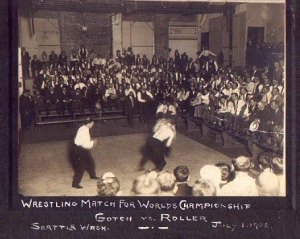
"Roller Falls Before Giant Pole in Match at Buffalo," Seattle Times, May 17, 1910, 15.
Roller has not been making much of a showing in his matches of late. He usually gets hurt and loses, and he puts in the time between matches in various hospitals nursing his hurts and fighting off attacks of blood poisoning. But Roller has the money, and gets a chunk of it every time he starts.
"Hindu Hugs Roller So Hard He Cracks Two of His Ribs," Seattle Times, August 9, 1910, 13.
‘Doc’ is the real unfortunate kid. Every time he loses a match the report follows that he has broken a rib, dislocated a shoulder, developed an abscess or sprung a new crop of boils. Defeat affects him strangely, but he recuperates quickly when there is another match in sight…
He must have caught a Tartar Monday in this Gama man. Roller had a big advantage in height and weight, yet this smoked Hindu man not only threw him two falls in less than two minutes, but crushed two of his ribs during the operation…
Some live promoter will be sleeping on the job if he does not bring Gama over here for a campaign, with Gotch reserved for the last man… Now if Gama will come over here and toss three or four men, it is a cinch that he would pull a big house when he is matched with Gotch.
It is almost as equally certain that Gotch will flatten him like a gob of mud on a puncheon floor.
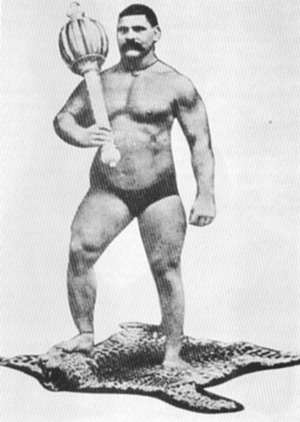
The Great Gama
"Seattle Man Not Impressed by Gama, Indian Wrestler," Seattle Times, September 4, 1910, 27.
‘He just banged Roller about by main strength. Gama was puffing like a porpoise and seemed much nearer exhaustion than Roller when he discovered quite by accident that Roller’s ribs were sore. Then he kept digging and punching away at the sore spot until Roller was worn out and had to succumb…’
‘I called to see Roller the day after the match and he was in bed nursing his sore ribs. His wife was with him, and Jack Curley and his wife were also there. Curley was going to take the two women on a shopping tour and Roller had ordered some chops for himself. The English waiter took Roller’s order to mean that he wanted chops and trimmings for the whole party, and when I got there Roller had the bill in his hand and was on the verge of apoplexy.’
‘The bill called for $14, and Roller indulged in some lurid language as he gave his opinion of the stupidity of English waiters.’
Those who know Roller can readily understand how that bill for $14 hurt him far worse than his broken ribs.
"Little Real Crookedness in Wrestling Game Now," Lloyd Kenyon Jones, Seattle Times, September 11, 1910, Sports, 4.
And what, pray, makes crooked wrestling?
The betting? Very seldom… [The wrestler’s] idea of business is to get his
guarantee or percentage and let it go at that. But sometimes there is a
reason – a very good one. And crookedness may be the desire of a capable
wrestler to give the fans a run for their money. It is crooked to let a
fellow ‘stay’ longer than he can stay. It is crooked to throw a fall even
if the match itself is won; that is, the other two falls. But it is often
done, and is not infrequently done without the knowledge of the poorer
man… And beyond that is the fact that a good man isn’t going to wear himself
out throwing poor men in jig time.
In the first place, he may not care to expend his strength in a sudden burst of speed, preferring to let the other fellow wear himself out before the climax is brought about. In the second place the wrestler might harbor a certain amount of revenge and purposely put his opponent in numerous bad positions and to considerable pain before culminating the match in a fall. A third element is found in the possibility that the poorer man is very tricky under certain conditions, and the better man does not propose to give the other fellow any advantage. Therefore he tries to wear his man out without taking any chance whatever in actually trying to throw him. The fourth reason may be to cover up the actual ability the better man possess so that some other match may be arranged between himself and a more worthy opponent. The fifth reason may be that the better man is not in the best of condition. Naturally his opponent does not care to take the chance of rushing the affair to a speedy conclusion. He estimates that the other fellow is willing to take a match over a considerable route, and is very glad to take advantage of the situation. There have undoubtedly been times in the career of even the best men when vastly inferior grapplers could have thrown them had they known the truth about the condition of their ordinarily better opponents.
The following is how the match was reported in Seattle.
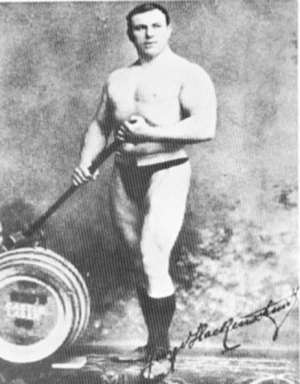
While in Europe, Roller and his manager
Jack Curley looked up Hackenschmidt and proposed that he make another North
American tour. Hackenschmidt liked the idea, and so soon after he left
Europe for North America, where night after night he thrilled the crowd
by throwing Ben Roller.
"Dr. Roller Tossed Twice by Mighty Hackenschmidt," Seattle Times, November 29, 1910, 16.
Hack is billed to wrestle Jess Westergaard in Chicago in a finish match pretty soon. He will beat Jess, too, and after cleaning up a few more like him the boards will be swept clean for Gotch. Along about the first of the year the yapping will begin for Gotch to come out of his retirement and clip the whiskers of the Russian Lion, who, by the way, is a German.
"Hackenschmidt Does Away with Ringside Challenges," Seattle Times, December 4, 1910, Sports, 4.
Hackenschmidt continues to follow out his avowed purpose of wrestling himself into condition during his tour on the road. He is barring nobody, and even during his idle moments welcomes the coming of aspirants who seek only a little practice bout with him.
"Many High Class Men in Wrestling Game at Present," Lloyd Kenyon Jones, Seattle Times, December 4, 1910, Sports, 4.
"Roller Gets Rich Losing Every Bout," Seattle Times, December 18, 1910, Sports, 1.
Jack Curley, who formerly was Roller’s manager, … writes that Roller is showing just as often as he can get a date, and is simply raking in bundles of kale…
"Roland Cotterrill Tells of Roller and Mat Game in East," Seattle Times, December 19, 1910, 13.
‘Some of our Seattle people have said some harsh things about Doc Roller, but I want to tell you he is a credit to us and is advertising Seattle in great shape. I have been through various Eastern cities and ‘Doctor B.F. Roller of Seattle’ is in every paper you pick up and on every billboard.
"Big Mahmout Exposes Fakers in Wrestling," Seattle Times, January 1, 1911, Sports, 1.
One was the Hackenschmidt-Gotch match, which as an exhibition was the worst ever seen. But it was honest. Another with a taste of squareness was the Mahmout-Americus contest, one fall of which was on the level. The other square bout is not exactly known.
The information comes with the declaration of Mahmout the Turk that he is going to reform… It is safe to say that 99 per cent of all wrestling matches where an admission fee is charged and where professionals take part have been prearranged before the men shake hands. Many have even trained together – those that made any show of training. The hitting and biting in the matches, the kicking, the calling of foul vulgar names, the threats, the falls from the stage, the challenges from the audience – all those things are the little jokers used to stir up the maddened crowd. It does little harm, and it makes the game ‘good,’ say the wrestlers.
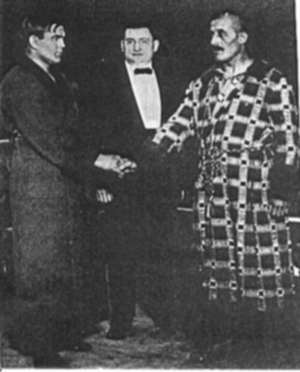
Frank Gotch (left) and Youssouf Mahmout
(right); referee unidentified.
Hergeleci Ibrahim, who wrestled as
Youssouf Mahmout, was born in the
Bulgarian village of Islopol, near
Razgrad, in 1848. He was the Turkish
Kirkpinar champion of 1914, and died
the following year.
"Dr. Roller is Hack’s Real Backer on Present Tour," Seattle Times, February 8, 1911, 13.
Every time business gets a little dull and Hack has an open date he flops Roller and, as the man from Battle Creek, Mich., has it, ‘there’s a reason for it.’
… Roller is Hackenschmidt’s financial backer this trip. Jack Curley always tells with a straight face about how rich Hack is and how he wrestles only for the love of the sport and not for the lure of the coin, but just the same, they say it was ‘Doc’ Roller of Seattle who put up the $20,000 guarantee for Hack’s present tour.
Curley and Roller ostensibly parted company when Hack came over here, and that made it possible to use Roller as an opponent to Hack when others were shy about coming forward. And at that Roller can put on a better show with the big Russian than almost any other man in the country, so those who pay their money to see the men in action do not get cheated a bit.
But it really is amusing to read every so often about Hack and Roller, his real manager, having had a terrific struggle, and always in a different city. Roller will clean up a bunch of money on Hack’s tour and he is entitled to it for being game enough to take a chance on the proposition…
Frank [Gotch] will now go the rounds, trimming Beell, Ordeman, Roller maybe; Jess Westergaard, possibly old Farmer Burns, and then wind up with Zbyszsko [sic] and Hackenschmidt. It’s the old merry-go-round that is worked year after year. The public likes it and there’s nothing better in sight, so what’s the difference?
"Both Wrestlers Were Using Assumed Names," Seattle Times, February 13, 1911, 13.
McRay is not the first to die following a match with Olson. Several years ago a black wrestler succumbed, following a mat match with Olson, in Montreal, Canada…
This is one reason why there is so much ‘faking’ in the mat game. There is very seldom enough at stake to make really good men endure the punishment incident to a real battle to the finish.
Both piledrivers and crotch holds were (and are) quite normal tricks of the trade. But "to reduce the risk," the sports started clamoring for the elimination of "the deadly toe hold," a move that sometimes caused injuries but so far as I know never killed anyone.
Now, admittedly, the toehold was not
a nice move. Instead, as described by E.J. Harrison in Wrestling(London:
W. Foulsham & Co., 1934), page 76, it was a "really nasty and potentially
dangerous lock. It is applied when your opponent is lying face downward
on the mat. Cross his feet, say the right over the left, above the ankle;
then locking them against your chest, force him to bend his legs. Then
reaching forward and downwards you clasp both hands against the crown of
his head which you force backwards, in this manner inflicting intolerable
pain upon his spine and neck." Nevertheless, it was a controllable submission
technique, and thus far safer than throwing the wrestlers into the chairs.
But it wasn’t nearly as thrilling to watch.
"Dr. Roller Thinks Deadly Toe Hold Should Be Barred," Dr. B.F. Roller, Seattle Times, February 20, 1911, 10.
I think, however, that Gotch would have eventually become champion without this terrible hold, thus adding force to my argument that the toe hold produces little except punishment…
I am not in favor of making wrestling a gentle sport, by any means. I want to see it just as rugged as it can be made, but I want it to be, above all things, sportsmanlike…
"Champion Wrestler of Japan Meets Defeat at Last," Seattle Times, March 3, 1911, 17.
The chief is said to base his opposition to wrestling bouts on the ground that the people who attend them are ‘not the right sort.’ This will be an awful jolt to the pride of some of the swells who used to have ringside seats at all the big matches here…
"Frisco Sports Do Not Care for Wrestling," T.P. McGilligan, Seattle Times, April 18, 1911, 13.
… There were few of those present who seemed to have even a rudimentary knowledge of the most ancient sport in the world. Some of the boys were calling the half-nelsons half-uppercuts, and when Gotch pressed an English arm lock on Ordeman now and then, the more excitable lads in the gallery wanted Gotch disqualified for hitting in the clinches.
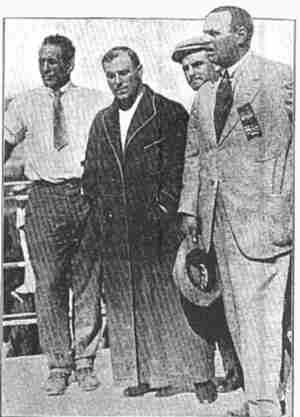
From left to right, Roller, Hackenschmidt, Americus, and Jack Curly; the photo was taken just before the match with Gotch in Chicago
"Dr. B.F. Roller Is Not Satisfied with Hack’s Work on Mat," Dr. B.F. Roller, Seattle Times, September 5, 1911, 1.
He is a greater man than I ever thought he was. I think he is better today than I ever saw him in my life. Gotch wrestled very cautiously, he wrestled beautifully, but after all it was temperament more than anything else that defeated Hack…
The only way to see him [Hackenschmidt] at his best, however, is to spring a surprise match on him with an hour’s notice. For the past week, at least, he has slept very little…
His stubbornness made it impossible for us to have control over him. I tried to outline his condition and I told him that it should be a rushing fight, but he told me to shut up, that he knew what he was doing…
I saw Monday morning at sunrise that Hack’s courage was waning. I don’t want to say much of this sort, for I do not want the public to think I am turning against a man because he is defeated, but I must admit that, as I predicted yesterday, gameness was a long factor in this contest…
In the gymnasium he [Hackenschmidt] is a greater man than he showed today, but unfortunately championship matches are not wrestled in gymnasiums. I tried my best to make a winner out of him and put him into the ring in the best possible condition, but as I said yesterday, gameness is something you cannot put into a man. I am glad the thing is over and I would not go through with it again for the entire gate.
"Dr. Roller Calls, Looking Like General Prosperity," Seattle Times, September 25, 1911, 12.
‘I firmly believe that Gotch was scared, too, but Gotch is a good bluffer, so he made a few rough passes at Hack, and Hack simply wilted. I was terribly disappointed in Hack’s showing because I had worked hard with him, and, had he won, I would have cleaned up about $80,000 with him showing him around the country.’
But Roller really did not do so badly on the big match as that, for he has just been over to Yakima buying another bunch of fruit land with the money gleaned at Chicago. Had Hack won he figured on buying the whole county, but as Hack quit cold on him he had to be content with just buying one more ranch. By the way, the big doctor now calls Yakima [Washington] his home town…
Gotch beat himself out of a nice chunk of money by insisting upon a guarantee of $21,000. Frank never was much of a hand at taking a chance. He was offered 40 per cent as his bit, but he preferred a guarantee of $21,000 and 50 per cent of the moving pictures. Roller and Curley, who were not afraid to take a chance, cleaned up much more money than Gotch did, and they will have half of the picture money with which to buy meal tickets this winter.
The American wrestling audiences meanwhile
clamored to see more of Frank Gotch’s deadly toehold.
"Toe Hold Not Barred at Dreamland Tomorrow Night," Seattle Times, November 2, 1911, 15.
… the champion will be seen in a good
work-out, and that will be worth the price of admission. An exhibition
bout between two clever men is far more enjoyable than a blood match anyway,
for the wrestlers can thus illustrate all the holds in the game and how
to break them, where they would be afraid to take chances in a blood match.
"Jack Johnson Fat as Prize Porker Will Fight No More," Seattle Times, December 12, 1911, 15.
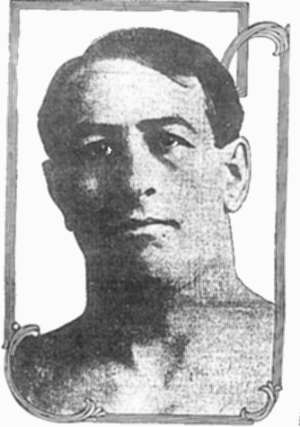
Benjamin Franklin Roller
"Seattle Athletic Club Puts on Big Smoker Tonight," Seattle Times, December 15, 1911, 21.
"Foreign Wrestlers Poor Lot Yet Demand Big Money," Lloyd Kenyon Jones, Seattle Times, December 19, 1911, 19.
These other Europeans aver they are the masters of Hack – but they never wrestled him as far as the records show. Their titles for the most part have been won in tournaments, and in this connection let us quote the words of a man familiar with these tournaments.
‘A wrestler aspiring to easy money, engages a grappling band of twenty or thirty ordinary mat men at a weekly stipend. He stages his tournament. He calls it, perhaps, the world’s championship – as Ralcevich did in Mexico after Gotch trimmed him in Chicago. Being the employer, he graciously wins.’
If this is the brutal truth, let it be known. If European titles have grown on shrubs of this kind, let Americans study the botany of their own species and draw their own conclusions.
"Short Jabs at Sport," Seattle Times, March 19, 1912, 13.
"Gotch-Hack Fiasco Put Big Crimp in Wrestling Game," Hugh E. Knough, Seattle Times, April 14, 1912, 29.
"Large Belgian Wrestler Breaks One of Roller’s Ribs," Seattle Times, November 16, 1912, 9.
Footnotes
FN1. For insight into Pacific Northwest police corruption, see William J. Chambliss, On the Take: From Petty Crooks to Presidents (Bloomington: University of Indiana Press, 2nd edition, 1988). With a little effort, one could surely document similar situations in most US cities of the period.
FN2. Lou Thesz insists
that Hackenschmidt’s knee injury was the result of a match with Ad Santel.
Santel was in Chicago in January 1911 (his moniker was Adolph Ernst), so
Santel and Hackenschmidt could have worked and trained together. Nevertheless,
it is strikes me as unlikely that a last-minute injury caused Hackenschmidt
to fall (lose is surely not the correct verb to apply to the outcome of
any twentieth century professional wrestling match) to Gotch in Chicago.